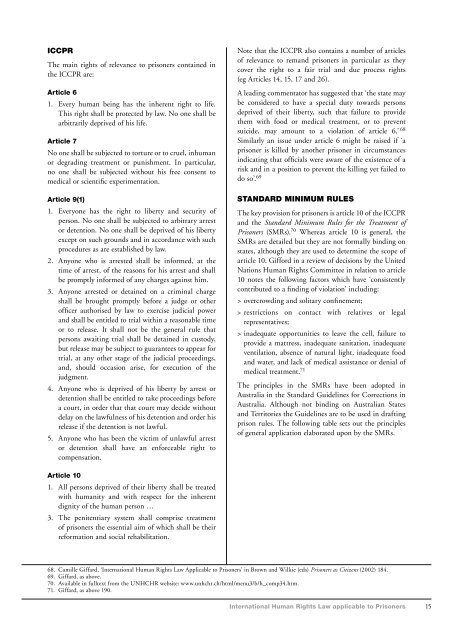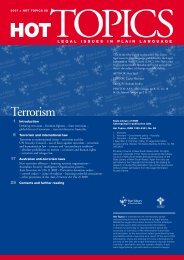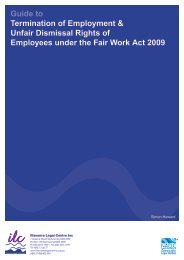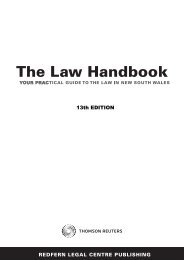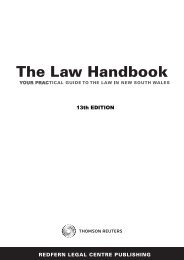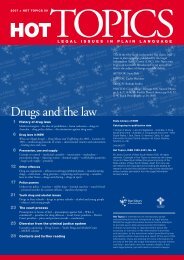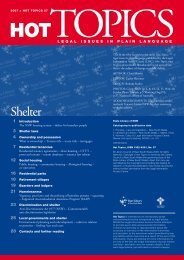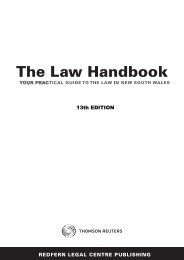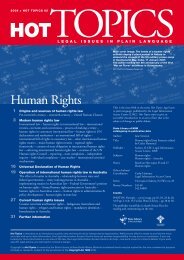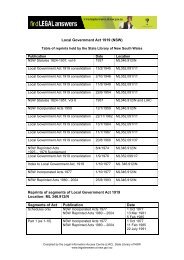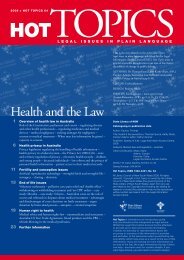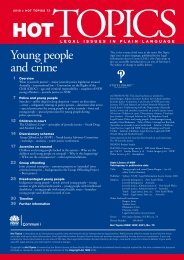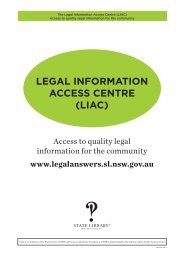Prisoners - Legal Information Access Centre - NSW Government
Prisoners - Legal Information Access Centre - NSW Government
Prisoners - Legal Information Access Centre - NSW Government
Create successful ePaper yourself
Turn your PDF publications into a flip-book with our unique Google optimized e-Paper software.
iccpr<br />
The main rights of relevance to prisoners contained in<br />
the ICCPR are:<br />
article 6<br />
1. Every human being has the inherent right to life.<br />
This right shall be protected by law. No one shall be<br />
arbitrarily deprived of his life.<br />
article 7<br />
No one shall be subjected to torture or to cruel, inhuman<br />
or degrading treatment or punishment. In particular,<br />
no one shall be subjected without his free consent to<br />
medical or scientific experimentation.<br />
article 9(1)<br />
1. Everyone has the right to liberty and security of<br />
person. No one shall be subjected to arbitrary arrest<br />
or detention. No one shall be deprived of his liberty<br />
except on such grounds and in accordance with such<br />
procedures as are established by law.<br />
2. Anyone who is arrested shall be informed, at the<br />
time of arrest, of the reasons for his arrest and shall<br />
be promptly informed of any charges against him.<br />
3. Anyone arrested or detained on a criminal charge<br />
shall be brought promptly before a judge or other<br />
officer authorised by law to exercise judicial power<br />
and shall be entitled to trial within a reasonable time<br />
or to release. It shall not be the general rule that<br />
persons awaiting trial shall be detained in custody,<br />
but release may be subject to guarantees to appear for<br />
trial, at any other stage of the judicial proceedings,<br />
and, should occasion arise, for execution of the<br />
judgment.<br />
4. Anyone who is deprived of his liberty by arrest or<br />
detention shall be entitled to take proceedings before<br />
a court, in order that that court may decide without<br />
delay on the lawfulness of his detention and order his<br />
release if the detention is not lawful.<br />
5. Anyone who has been the victim of unlawful arrest<br />
or detention shall have an enforceable right to<br />
compensation.<br />
Note that the ICCPR also contains a number of articles<br />
of relevance to remand prisoners in particular as they<br />
cover the right to a fair trial and due process rights<br />
(eg Articles 14, 15, 17 and 26).<br />
A leading commentator has suggested that ‘the state may<br />
be considered to have a special duty towards persons<br />
deprived of their liberty, such that failure to provide<br />
them with food or medical treatment, or to prevent<br />
suicide, may amount to a violation of article 6.’ 68<br />
Similarly an issue under article 6 might be raised if ‘a<br />
prisoner is killed by another prisoner in circumstances<br />
indicating that officials were aware of the existence of a<br />
risk and in a position to prevent the killing yet failed to<br />
do so’. 69<br />
sTAndArd minimum rules<br />
The key provision for prisoners is article 10 of the ICCPR<br />
and the Standard Minimum Rules for the Treatment of<br />
<strong>Prisoners</strong> (SMRs). 70 Whereas article 10 is general, the<br />
SMRs are detailed but they are not formally binding on<br />
states, although they are used to determine the scope of<br />
article 10. Gifford in a review of decisions by the United<br />
Nations Human Rights Committee in relation to article<br />
10 notes the following factors which have ‘consistently<br />
contributed to a finding of violation’ including:<br />
> overcrowding and solitary confinement;<br />
> restrictions on contact with relatives or legal<br />
representatives;<br />
> inadequate opportunities to leave the cell, failure to<br />
provide a mattress, inadequate sanitation, inadequate<br />
ventilation, absence of natural light, inadequate food<br />
and water, and lack of medical assistance or denial of<br />
medical treatment. 71<br />
The principles in the SMRs have been adopted in<br />
Australia in the Standard Guidelines for Corrections in<br />
Australia. Although not binding on Australian States<br />
and Territories the Guidelines are to be used in drafting<br />
prison rules. The following table sets out the principles<br />
of general application elaborated upon by the SMRs.<br />
article 10<br />
1. All persons deprived of their liberty shall be treated<br />
with humanity and with respect for the inherent<br />
dignity of the human person …<br />
3. The penitentiary system shall comprise treatment<br />
of prisoners the essential aim of which shall be their<br />
reformation and social rehabilitation.<br />
68. Camille Giffard, ‘International Human Rights Law Applicable to <strong>Prisoners</strong>’ in Brown and Wilkie (eds) <strong>Prisoners</strong> as Citizens (2002) 184.<br />
69. Giffard, as above.<br />
70. Available in fulltext from the UNHCHR website: www.unhchr.ch/html/menu3/b/h_comp34.htm.<br />
71. Giffard, as above 190.<br />
international human Rights Law applicable to prisoners 15


